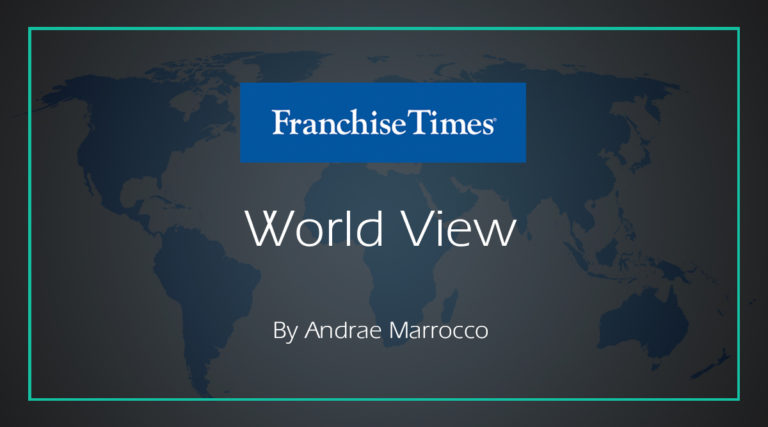
This article was first published online by Franchise Times on December 29, 2020 and subsequently published in the January 2021 print edition.
After a year that’s been aptly described as unprecedented, unpredictable and in some ways flat out unbelievable, international franchisors haven’t stopped evolving. Some advancements are here to stay, while other transformations to the business model are still underway as franchisors process and adapt to the new world.
A prevalent trend during the pandemic is the rise of international brands actively seeking out furloughed professionals — or those concerned about possible furloughs — across the world as desirable prospective franchisees. “This has given international franchisors and master franchisees increased expansion options and opportunities,” noted Jim Hartenstein, an international consultant at Hartenstein Global Consulting and former senior VP of international at Little Caesars and Wendy’s.
Many of these individuals, having come from senior corporate roles in related industries, possess the trifecta of sophistication and experience, business acumen and solid investment capital. These former corporate professionals, in light of the global uncertainty and the stage of their career, have discovered the major long-standing appeal of franchising — to have more control over one’s destiny — now outweighs other opportunities. Franchisors see these individuals as excellent candidates for area development or even master franchise deals.
Beyond that trend, there has been a surge in middle management individuals being sought out (on similar circumstances and rationale) for single and multi-unit franchise arrangements. Such individuals are ripe for taking on franchises under existing masters or in pairing them with new masters described above as a comprehensive solution for expansion into new jurisdictions.
Drilling down more into this trend, we discover that international brands are reaching out more to and identifying these prospective franchisees through social media platforms. That shift comes against the backdrop of restricted travel over the past several months. The corollary of this, given ongoing global restrictions, is that international franchisors have had to rethink their recruiting and qualifying processes that follow online lead generation.
For one thing, previous methods for due diligence on candidates have been curtailed. While there is no impact to the typical background checks through governmental agencies and other databases, international brands are largely precluded from sending representatives to prospective franchisees’ jurisdictions to directly assess their competencies, background, and how they operate any existing businesses.
“To illustrate, if an international franchisor is speaking with a prospect in the restaurant space that has existing business operations, the franchisor will want to go out and see how those businesses are conducted through the eyes of the franchisor and in the context of its own brand,” said Hartenstein. You can ask others how the prospects are running the business but it is not the same.
Reputational diligence is another area that international franchisors have had to re-evaluate, because even though there are professional firms that provide such services, it is not a substitute for sending internal representatives to meet with stakeholders such as suppliers, competitors in the industry, and others doing business with the relevant candidates. Some international brands have taken to doing some of this due diligence through video conferencing. It remains to be seen whether this evolution gains further traction after the pandemic restrictions are lifted.
Increased reliance on franchisees
Another major paradigm shift through the pandemic has been the increase in franchisee-led localized decision-making. Unsurprisingly, this has been largely due to the wide-ranging pandemic conditions and differing levels of restrictions. Insightful international franchisors have worked with franchisees to address everything from supply chain challenges to store opening hours.
Offering two examples, Hartenstein said franchisors have had to be flexible in making decisions together with their franchisees in promoting certain products where some operators do not have access to the necessary ingredients because of supply chain issues in their region, and determining the reopening of dining rooms — even where permitted by local regulations — because for some franchisees “it remained unprofitable in light of the health protocols and limitations on seating.”
Ultimately, this has led to franchisees having more power to determine various elements of their franchise system, and in many cases has resulted in enhancements to those business models as more minds turn to improving the system. Particularly for international brands with a broader footprint, pivoting and repositioning required heavy reliance on franchisees in their local jurisdiction. More than that, international franchisors have had to rely on their franchisees for market intel.
In what seems to be the distant past environment of business as usual, an international franchisor could and would often send representatives routinely to each of the jurisdictions in which it had franchisees to undertake market assessments. Once again, because of the restrictions in many parts of the world standing in the way of such activities, franchisors are relying on franchisees to feed that information back to them. Some commentators say that the increased engagement and reliance on franchisees will — for prudent franchisors — pave the way for improved innovation, insight and creative solution to franchise expansion and operations.
As pandemic restrictions ease, and things return to some kind of normal, the expectation is that many of these new practices will continue. It is also likely that franchisors will have to manage greater levels of local-market decision-making in the post-COVID world.
Some franchisors are reluctant to cede what they see as necessary franchise control, while the local franchisees who have become more accustomed to such delegation will expect their influence to continue. The pandemic has proven the old saying that one size does not fit all.
